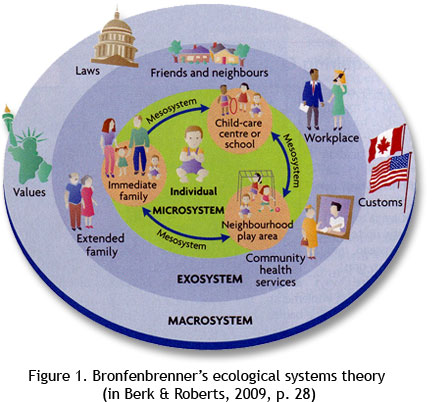Lesson 11: Family Culture - A Comparison and Respectful Response

Learning Outcomes
Upon completion of this lesson's material, students will be able
- Discuss Urie Brofenbrenners ecological systems theory as it relates to child and family culture
- Evaluate the cultural responsiveness in the environment.
- Describe how families are encouraged to share their culture in the education setting.
- Explain how family culture can influence curriculum.
Teaching
You may have heard of Urie Brofenbrenner’s ecological systems theory which explains how the child grows and develops based on how levels of ecological systems impact him or her.
The most intimate level is the microsystem. This level has the most impact on individual development and contains only the immediate environment the child lives in and relationships with immediate family or caregivers.
The mesosystem is how the different parts of the microsystem interact with each other for the sake of the child. For example: a parent teacher conference, a home visit or a parent volunteering in the classroom can have a positive or negative impact on the child, thus impacting his or her development.
The exosystem contains people and places that the child may or may not see much. However, it is still significant to the child’s individual development.
The Macrosystem has the least impact but is still in the scope of importance to a child’s development.
Let’s take a closer look at the microsystem.
Child-care or school – This is us! Look at how important we are to the child’s development! We are a part of their individual growth and culture. We can make a difference!
Immediate Family – There it is right there, the family. Right there with us in the microsystem, impacting the child individually and influencing their every milestone. I cannot stress enough how important the mesosystem between us and the family is. We must strive toward partnership with the family so we can optimize development. Imagine the endless possibilities for children if we went beyond friendly relationships with families. What if we strengthened the mesosystem by learning about them? What if we learn about what their beliefs and values are related to the child? What if we partnered with them and incorporated pieces of their culture (values and beliefs etc) into the learning environment so that we enhance development?
Your Developmentally Appropriate Practice text discusses this further on page 45. To be an excellent teacher means establishing reciprocal relationships with families……
As you read page 45 take note of how many times they reference family culture. What does that mean for you?
Assessment
Lesson 11 Assignment
Read Principle 5 in the Multicultural Principles and submit a paper with answers to the five questions on page 44. You may need to have conversations with your supervising teacher to answer all of the questions.
Lesson 11 Discussion
How does each ecological system impact your own individual culture? Do you think each parent in your program is experiencing the same ecological system impact? Explain.